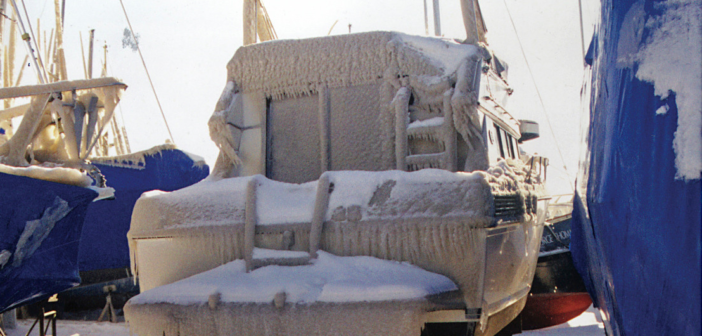SPRINGFIELD, Va., Sept. 27, 2021 – Recreational boat owners are preparing their boats for a long winter’s nap, but sugarplums aren’t dancing in their heads. What may keep them up at night is hoping cold temperatures won’t damage their boats. Freshwater expands in volume by about 9% when it freezes and can push outward with a force of tens of thousands of pounds per square inch, cracking engine blocks, damaging fiberglass, splitting hoses and waterlines, and destroying refrigeration systems. Boat Owners Association of The United States’ (BoatUS) marine insurance provider, GEICO, shares that boaters often don’t become aware of the damage until springtime.
To prevent your boat from becoming a winter storage statistic, BoatUS has a three question, true-false quiz for boaters to test their winterizing knowledge and also offers a free Boater’s Guide to Winterizing that includes a two-page winterizing checklist, as well as other winterizing resources, at BoatUS.com/Winterization.
1. True or false? A boat’s internal gas tank should be left nearly full of fuel over the winter.
Answer: True. Before there was ethanol in our nation’s fuel supply, the best advice was to leave the tank as empty as possible, ensuring you could add plenty of fresh gas at the start of the next season. For built-in gas tanks today, however, the name of the winterization game is to prevent condensation from forming on the inside of the tank walls, typically a result of daily freeze/thaw cycles. Boat fuel systems are not closed and draw in humid air via the vent. Keeping the tank nearly full, with a little room for expansion, doesn’t give water droplets the chance to form and mix with the fuel, which may contain up to 10% ethanol, potentially leading to phase separation. Phase separation is when water and ethanol separate out from the fuel and settle on the bottom of the tank. This phase-separated cocktail can stall out or even damage your engine. Also note, never plug a vent, as it can rupture the fuel system.
Portable gas tanks, on the other hand, are best removed and emptied, typically into a vehicle if the gas is unmixed or, if mixed, used in other two-stroke engines. One caveat for boats stored in racks − be sure to check your marina’s fuel-storage policy. Also, understand that once fuel becomes phase separated, no amount of additives or fuel stabilizers can help. The contaminated fuel and water mixture must be safely removed by a professional. Read more:
https://www.boatus.com/news-room/release/boat-winterizing-truth-or-myth-test-your-know




